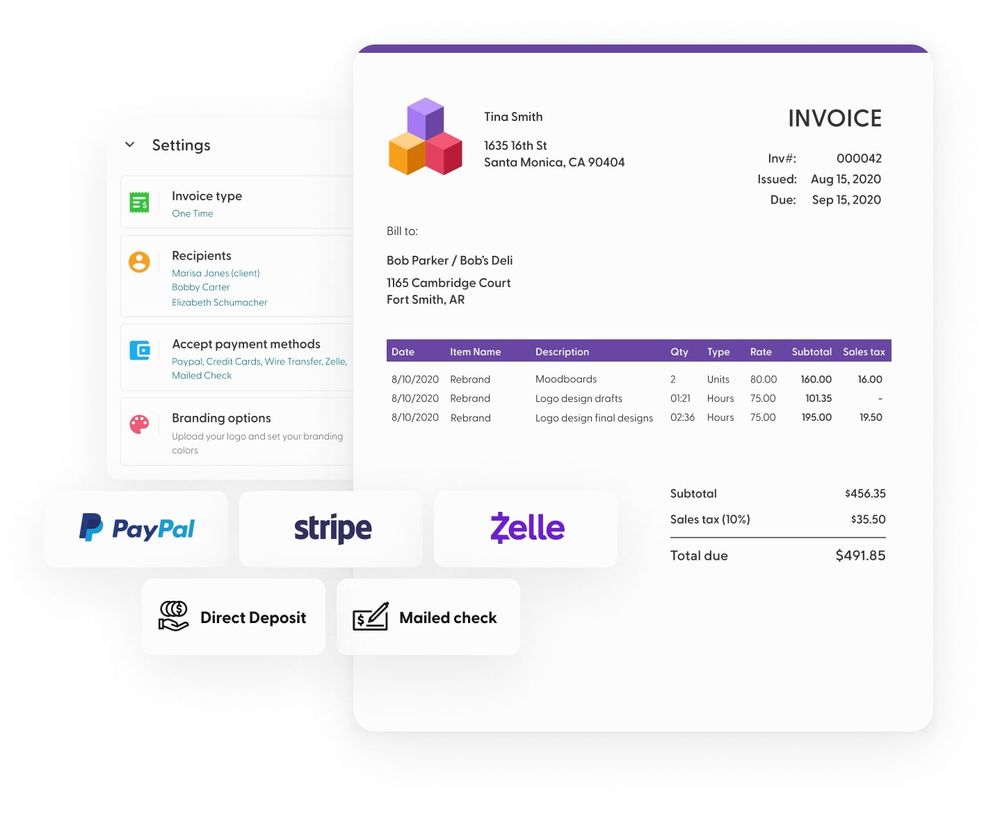Clients pay 60% of the invoices late, with the average delay being 4.3 days. These late payments can disrupt your cash flow and make it difficult for you to run your business.
Late-paying clients are a part of the service business, and as a service provider or agency, you need to know how to deal with late-paying clients. Let's discuss why a client doesn't pay and what to do if they don't.
Reasons Why Clients Don't Pay On Time
Before delving into the steps you can take if a client doesn't pay, you need to understand why clients refuse to pay on time. There could be several reasons, such as:
They Aren't Allowed to Process the Invoices
If you're working with a small business firm, the chances are that the actual client you deal with isn't authorized to process invoices. This is common in larger companies that have dedicated departments for managing invoices and other finances. If you are sending your invoices to the wrong person, your payments could get delayed.
They Forgot to Pay
Clients may see and acknowledge your invoice when you send it, but then forget to pay. You can overcome this issue by sending reminders to your clients, asking them to pay the invoice. However, ensure that you don't overwhelm with too many reminders.
They Didn't See the Invoice
Clients can be busy, especially at the beginning of the month, when most freelancers send invoices. If they have an influx of emails in their inbox, they might never see your invoice. That's why sending invoice reminders is crucial.
They Didn't Understand the Payment Terms
Be sure to mention payment terms clearly on the invoice you send. Most invoice tools and templates set your invoice to NET 30. Extending credit to your clients for 30 days is very generous, but the due date should be made as clear as possible. By making your payment terms clear, you can avoid miscommunication and increase your chances of getting paid on time.
They Don't Have the Money to Pay
It's possible that your client isn't paying on time because they don't have the required money. If you know your client is in a poor financial situation, give them some time to get back on track. You can surely take legal action, but it will cost you time and money and also ruin your relationship with the client.
They're Ignoring You
This might hurt, but it isn't uncommon for clients to ignore freelancers or agencies when it comes to paying. Again, it could be because of many reasons. Perhaps they are facing a financial problem, and they aren't comfortable sharing it, so they're ignoring you. Maybe they didn't like your work and aren't sure if they should pay.
They're Not Motivated to Pay
You may think that it's the client's moral and legal obligation to pay on time, and you are absolutely right. You have done the hard work, and you deserve to get paid. However, some clients may not think that way and continue to delay the payment. It could be because you don't reward early payments or your payment terms are too lenient.
The unfortunate reality is that difficult clients are everywhere. Whether they pay your invoices late or demand too much out of you, there are several ways you can handle them. Check out our video, "How to Deal with Demanding Clients," to find out exactly how to manage a difficult client.
Steps to Take If a Client Doesn't Pay on Time
Now, what to do if a client doesn't pay on time, or worse, refuses to pay? There are a few steps you can take. Let's discuss them.
Follow Up at Regular Intervals
If a client doesn't pay invoices on time, the chances are high that they didn't see it or forgot to pay. Before assuming that your client is deliberately not paying, try following up with them multiple times. Send friendly email reminders or call them to ask for payment.
Invoicing tools allow you to set up automated email reminders so that you don't have to manually send emails every time a client doesn't pay.
Send the Invoice Again
As discussed, if clients aren't paying on time, they may not have received your invoice. Make it a regular practice to send an invoice at least two times to ensure that the clients receive it. If you don't receive a response after following up and re-sending an invoice, try contacting a partner or superior. Politely explain to them the situation and why you are reaching out to them, and request them to forward your request to the primary client.
Send a Demand Letter
A demand letter is a document you send to a client to resolve a dispute, such as if a client refuses to pay. You can mention the amount of the unpaid invoice that the client owes you in the demand letter.
After you send a demand letter, two things can happen. First, the client accepts your demand and pays the invoice. Or second, they ignore the demand letter, which they can as it isn't a legal document. However, if someone ignores a demand letter, it can be used against them if the matter reaches small claims court.
Take Legal Action
If none of the above techniques work, you may have to drag your client to court. Find an attorney who specializes in these types of matters. An attorney will usually begin by writing letters for unpaid invoices. Many clients will open their checkbooks by the mere threat of legal action.
If you don't receive a positive response from the client, you can file a claim in the small claims court. The eligibility for filing a claim can vary from state to state. Usually, it's between $2,500 and $25,000.
Never Get Angry or Threaten the Client
Clients not paying can be frustrating, and anger is a natural emotion you might experience. You should never show your anger or frustration to a client. They may not be intentionally ignoring you, and the reason for late payment could be cash flow issues or other internal problems.
If you get angry or threaten a client, you may force them to pay the invoice, but that could be the end of your partnership with the client. Thus, consider legal action as the last resort if nothing else works.
Don't Work with them Again
Dropping a client can be a huge decision, especially if you are in the initial phase of establishing your freelance or agency business. But there will be times when you'll need to make tough decisions and drop clients.
If a client regularly pays late for no justified reason, it could be a red flag, and not working with them in the future could be your last option.
You will come across late-paying clients numerous times in your professional career. There are several steps you can take to prevent late payments:
- Charging a late fee
- Requiring partial payment upfront
- Use clear contracts
However, if a client doesn't pay even after taking all these steps, try to understand why the client is not paying. If the reason isn't genuine and the client is deliberately not paying, you can take further action.
Frequently Asked Questions
Can you take legal action without hiring an attorney?
Yes, you can take legal action without incurring the fee of an attorney. You can take the matter to the small claims court and resolve your disputes easily and inexpensively. You don't need any legal help to file a case in a small claims court.
How do you encourage clients to pay on time?
You can encourage clients to pay on time by offering them early payment incentives and charging late fees. However, timely payments depend a lot on your relationship with the client. If you share a good relationship with the client, your client will be less likely to delay payments.
Can clients withhold payment?
Clients can withhold payment if the agreed services have not been performed adequately, in their opinion. If you have failed to perform according to the contract, then you should fix this with the client. On the other hand, if the client is withholding payment unfairly, you should follow the dispute resolution procedures included in your contract.




